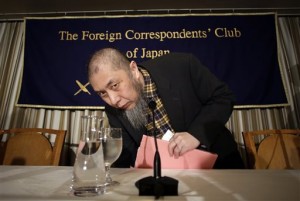Japan faces deadline to free Islamic State hostages
TOKYO — The deadline for paying ransom for two Japanese hostages held by the Islamic State group was fast approaching early Friday with no signs of a breakthrough.
Lacking clout and diplomatic reach in the Middle East, Japan has been scrambling for a way to secure the release of the two men, one a journalist, the other an adventurer fascinated by war. Two Japanese who said they have contacts with a leader in the Islamic State group offered Thursday to try to negotiate, but it was unclear if the Japanese government was receptive to the idea.
The militants threatened in a video message to kill the hostages within 72 hours unless they receive $200 million. Based on the video’s release time, that deadline would expire sometime Friday.
Government spokesman Yoshihide Suga said Thursday that Japan was trying all possible channels to reach those holding the hostages — 47-year-old freelance journalist Kenji Goto, and 42-year-old Haruna Yukawa, the founder of a private security company.
Goto’s mother was expected to make an appearance in Tokyo early Friday, in the first public comment by a family member.
Article continues after this advertisementSuga said Japan had not received any message from IS since the release of the video. Tokyo lacks strong diplomatic connections in the Middle East, and Japanese diplomats left Syria as the civil war there escalated, adding to the difficulty of contacting the group holding the hostages.
Article continues after this advertisementSo far, the only initiative made public was an offer by Ko Nakata, an expert on Islamic law and former professor at Kyoto’s Doshisha University, along with journalist Kousuke Tsuneoka. Both are converts to Islam.
Appearing at the Foreign Correspondents Club of Japan, Nakata, who is also a former Islamic specialist at the Japanese Embassy in Saudi Arabia, read a message in Japanese and Arabic.
“Seventy-two hours is just too short. Please wait just a bit longer, and do not try to take action immediately,” he said, addressing the militants. “If there is room to talk, I’m ready to go and negotiate.”
Nakata proposed offering $200 million in humanitarian aid to refugees and residents of areas controlled by the Islamic State, through the Red Crescent Society.
“The Red Crescent Society is operating under the Islamic State’s control. Why don’t we seek Turkey’s mediation and give the money for the people affected by the conflicts in Iraq and Syria? I believe this could be a rational, acceptable option,” he said.
A freelance journalist, Tsuneoka was released after being held hostage in Afghanistan in 2010.
Tsuneoka and Nakata visited Syria in September in an unsuccessful attempt to gain Yukawa’s release. Goto was seized sometime after late October when he entered the area, reportedly while trying to help Yukawa.
In his last communication with the Islamic State group several months ago, Tsuneoka said they had promised not to kill Yukawa or demand ransom.
“It’s a desperate situation,” Tsuneoka said. “I don’t recall a hostage who survived after appearing on the video.”
It is unclear if the two would be allowed to go to Syria, since they have been questioned by Japan’s security police on suspicion of trying to help a Japanese college student visit Syria to fight with the Islamic State group.
Tsuneoka said they would contact the militants only with a go-ahead by the Foreign Ministry, and could possibly ask representatives of the Islamic State group to meet with them in Turkey.
Suga refused to comment directly on their offer, though he said Tokyo was “prepared to consider all possible ways to save the two hostages.” Japanese officials have also not directly said whether they are considering paying any ransom, though Prime Minister Shinzo Abe said their lives were the top priority.
Nakata and Tsuneoka said their contact was with the Islamic State group’s current spokesman, whom they identified as Omar Ghrabah. But they said police surveillance and harassment had prevented any communication with him since early October.
Abe’s options are limited. Japan’s military operates only in a self-defense capacity a home so any rescue attempt would require help from an ally like the United States.
Japanese media have reported that Goto’s wife received an email in December asking for more than 2 billion yen ($17 million) in ransom, but it did not contain a threaten to kill Goto.
Abe has pledged $200 million in aid for refugees displaced by the fighting in Syria. In its ransom video, the Islamic State group accused Abe of providing money to kill Muslim women and children and destroy homes, a charge the Japanese government rejects.
Abe aims to raise Japan’s global profile and shift to more pro-active diplomatic and security roles, but this crisis could make the public more wary of greater involvement in the Middle East and other global crises.
In 2004, militants captured a Japanese backpacker, demanding that Japan pull its troops out of humanitarian projects in southern Iraq. The government refused, and the backpacker was found beheaded.
